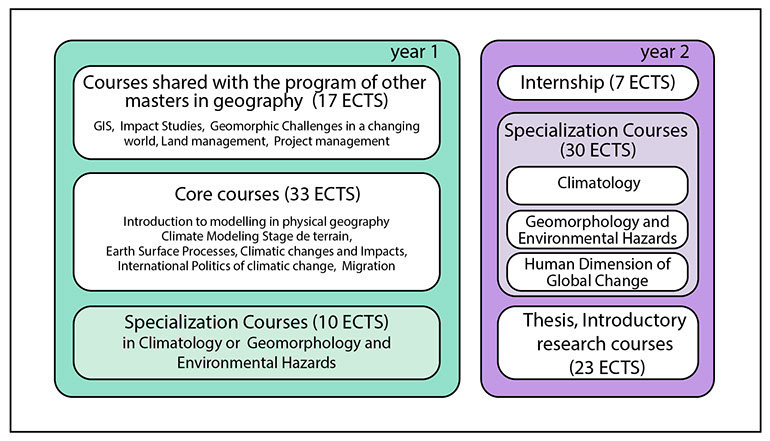Humans now play a leading role in transforming our planet. These transformations, including climate change, biodiversity loss, urbanization and land-use changes affect our environment at global, regional and local scales. This poses important challenges for our societies, including sea-level rise and coastal retreat, soil erosion and land degradation, increased exposure to natural hazards (floods, landslides, extreme weather conditions), decreased food and water security, as well as population displacement, migration, poverty and political instability.
The magnitude of these changes and their impacts on societies need to be better understood through in-depth study and scientific research, beyond the usual disciplinary divides. For example:
- How can one set a price for carbon if one does not understand the planetary cycle of this chemical element?
- How can one obtain food and water security without considering predicted changes in temperature and rainfall patterns?
- How can we mitigate the impacts of greenhouse gases and design better cities without good insight into the functioning of global and regional climatic systems?
- How can one predict and mitigate natural hazards without understanding their mechanisms and controlling factors?
- How can one address challenges of public health and environmental migration without understanding the environmental, societal and geo-political dimensions of these problems?
The Master in "Global change" (Climatology - Surface Processes - Human Dimension) aims to address these and other questions by providing a broad, interdisciplinary yet thorough scientific training on the issues linked to global change, their mechanisms at play, their interactions, as well as their implications for the environment and societies.
The master consists of a common core and a specialization part. The common core includes various skill-oriented courses, as well as a set of relevant introductory courses focusing on the three key dimensions of global change: climate, earth-surface processes and human dimensions.
In the specialization part, students can further develop their skill and knowledge along their own interests. For this, a wide range of courses is offered, focusing on three central and interdependent themes of global change: (1) climate change at local and global scales; (2) impacts of global environmental changes on the landscape, natural hazards and other earth-surface processes; and (3) human dimensions of global change.

The Master in "Global change" (Climatology - Surface Processes - Human Dimension) seeks to provide students with a strong multidisciplinary training that will help them address various aspects of global change as policy-makers, researchers, teachers, practitioners or campaigners. Increasingly, employers are looking for professionals who have both an in-depth scientific understanding of the issues at hand and the ability to reflect on them in a broader societal and geographical context. As such, this master opens a wide range of career opportunities in fields as diverse as research, policy-making, international organizations, advocacy and education.
Depending on your interest and prior training, two versions of this master can be followed: a master in 2 years (120 ECTS) for students having a relevant bachelor degree (see access conditions), and a master in one year (60 to 75 ECTS) for students already having a relevant master training (see access conditions). All courses of the one-year version are offered in English.

